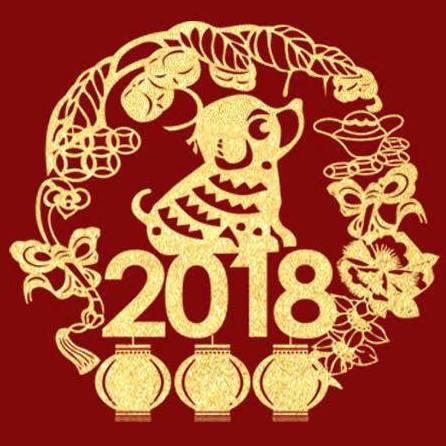 Chinese New Year is Feb. 16 and 2018 is the "Year of the Dog." DePaul University's Chinese Studies program will host its annual Chinese New Year Gala on Feb. 16 on its Lincoln Park Campus.
Chinese New Year is Feb. 16 and 2018 is the "Year of the Dog." DePaul University's Chinese Studies program will host its annual Chinese New Year Gala on Feb. 16 on its Lincoln Park Campus.CHICAGO — Chinese New Year is all about family, food and firecrackers. This year, it’s also about Fido.
The holiday, also known as Lunar New Year throughout Asia, begins on Feb. 16 and it’s the “Year of the Dog” based on the Chinese astrological signs of 12 animals. The last year of the dog was in 2006.
Chinese New Year in China is akin to Christmas in the United States, said Li Jin, director of DePaul University’s Chinese Studies program and an associate professor of Chinese.
“It’s the most significant event in China,” she said of the holiday, which spurs nearly 3 billion Chinese to travel home and many Asian businesses to close for a week. “It’s a time to welcome the new year with family.”
DePaul will hold its annual Chinese New Year celebration on Feb. 16 on its Lincoln Park Campus for its “family” of students, faculty and neighboring community.
Chinese New Year traditions are built on the premise of attracting good fortune and avoiding bad luck, Jin said. Whatever transpires on Chinese New Year’s Eve and Day is believed to stay for the entire year, she added.
Here are some ways to celebrate Chinese New Year:
- Wear red. Chinese mythology states that red wards off evil spirits, Jin said. Those born in a year of the dog (1934, 1946, 1958, 1970, 1982, 1994 or 2006), should wear red every day to avoid bad luck as people born under the celebrated astrological sign are believed to be most vulnerable to bad luck that year, she said.
- Eat dumplings. These are considered a lucky food because they resemble a Chinese unit of currency called a tael, so eating dumplings symbolizes wealth in the new year. Also, the Chinese word for dumpling sounds like the word for “change.” Other auspicious foods include tangerines and sweet pastries. Avoid sour foods as it implies a difficult and unlucky future, Jin said.
- Clean the night before, but not on New Year’s Day. Start the new year off with a clean house by clearing out old luck and bad spirits on Chinese New Year’s Eve. The Mandarin word for “dust” sounds like the word for “old,” Jin said. Leaving the house untouched on New Year’s Day ensures that good luck from the new year sticks around, according to Chinese tradition.
- Avoid negative words and arguments. Chinese New Year sets the tone for relationships for the rest of the year. In China, Jin said, people avoid certain words and numbers that have negative connotations such as the number “four” which sounds like the Mandarin word for death.
- Make noise. Chinese New Year celebrations traditionally involve setting off firecrackers to scare off evil spirits. While pollution concerns have stopped this tradition in China, Jin said, the idea is to make noise to keep bad luck at bay.
10th anniversary gala at DePaulThis year marks the 10th annual celebration of Chinese New Year at DePaul, hosted by the Chinese Studies program. Jin started the event in 2009 to provide a campus-wide opportunity for all DePaul students.
“About one-third of DePaul's international students are from China and this gala is a great way for those students to connect with American students as well as the entire community,” she said.
The event, which is open to the public, but requires registration, starts at 6 p.m. Feb. 16 in the Student Center, 2250 N. Sheffield Ave., Room 120 on DePaul’s Lincoln Park Campus. The free event includes cultural performances by DePaul students and traditional Chinese New Year food.
Details and registration can be found at
http://2018chinesenewyear.eventbrite.com. More information about DePaul’s Chinese Studies program in the College of Liberal Arts and Social Sciences is at
http://bit.ly/DPU_ChineseStudies.
###
Source:Li Jin
Ljin2@depaul.edu773-325-1882
Media Contact:Lorene Yue
lyue3@depaul.edu312-362-7788